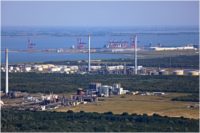P3s Proceed to Build or Rebuild Germany's Autobahn
While the German government undertakes a major management restructuring of the country's 13,000-kilometer Autobahn network, officials are steadily pushing ahead with a program of 24 public-private partnerships (P3s) to build or upgrade and operate nearly 1,500 km of its routes.
A $1.4-billion contract for a highway in Bavaria was signed in April, followed early this month by another deal in Hesse state, as the federal government prepares to take control of national highways from the Germany's 16 state governments.
Autobahn GmbH des Bundes, created two years ago, is taking over responsibility for planning, financing, building, operating and maintaining the entire network. With 15,000 staff headquartered in Berlin, it will be under the Federal Trunk Road Authority, which is an executive agency of the Federal Ministry of Transport and Digital Infrastructure.
Centralizing control of national highways follows last year’s decision by the federal government to halt privatization of the company charged with collecting tolls from vehicles weighing more than 12 tonnes. After an economic review, the federal transportation minister Andreas Scheuer decided that letting the government-run company Toll Collect GmbH. take over represented “better value for money.”
Created mainly by Daimler A.G. and Deutsche Telekom A.G., Toll Collect began developing the satellite-based system in 2002, aiming to get it running in under a year. Plagued by technical snags, the system became operational two years late, triggering huge compensation claims by the government in the meantime. These were settled in May 2018.
After raising $57 billion in tolls since the start of operations, the companies' franchise ended in September 2018, leaving the government as interim operator and searching for new private-sector owners in 2019. Apart from raising money for the government, truck tolls form the basis of fees paid to some operators in the country’s growing P3 network.
Germany's first highway P3s were financed by direct tolls collected by the private operators. Projects included tunnels under the Warnow and Trave rivers, both completed by 2005.
For the next P3s, the government changed course, relieving operators of toll collection responsibilities. For four “pilot” deals, covering around 230 km of highways and valued at over $1.1 billion, operators earn fees based on truck tolls collected by Toll Collect. The last of those P3 contracts was awarded in 2009.
That system still paid the contractors based directly on toll revenue from traffic volume. For the next nine projects, covering 540 km of routes worth an estimated $3.2 billion, fees were based not on traffic volumes but availability and quality of the assets. The first six of these contracts were awarded by 2017.
In April, the A3 Nordbayern consortium signed a 30-year P3 to widen 76 km of the A3 between Bielbelried and the Fürth/Erlangen motorway interchange. Paris-based Eiffage Group and German contractor Johann Bunte Bauunternehmung GmbH & Co. KG. will equally share the deal with a $1.6-billion construction value.
This month, the Autobahngesellschaft joint venture of Austria-based Strabag Infrastrukturprojekt GmbH. and the investment company Meridiam Investments SAS signed a $1.4-billion, 30-year deal for partial construction and operations of 62 km of the A49 highway between Fritzlar, south of Kassel, and the junction Ohmtal-Dreieck, north of Frankfurt. Strabag in joint venture with Leonhard Weiss GmbH & Co. K. will build 31 km of the route, while the northern half is already complete or under construction by others.
This is Strabag’s third German highway P3, notes CEO Thomas Birtel. The company has 100% of a P3 covering 58 km of A8 highway between Ulm and Augsburg. It won the contract with Hochtief A.G. in 2011 and bought the German contractor’s stake in 2018. Strabag also has a stake in the 30-year P3 covering 60 km of the A5 between Baden-Baden and Offenburg, completed in 2014.
This March, the government issued guidelines on compensation for cost delays arising from mandatory safe working practices during the pandemic. Compensation will be on a case-by-case basis, says Holgar Mylnek, an infrastructure specialist in the Frankfurt office of the law firm Ashurst LLP.
For emerging projects, special pandemic contract conditions are “now on the table,” says Mylnek.


